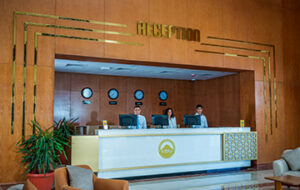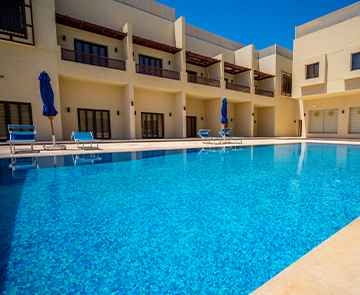Hotel and Resort Management Program
- Home
- Sharm El Sheikh
- Field of Tourism and Hospitality
- Hotel and Resort Management Program

Bachelor’s Degree Hotel and Resort Management Program
Program Details
| Courses: 55 Courses | Duration: 8 Semesters | Language: English |
| Seats: 100 Seats (47 Rsvd) | Credit Hours: 132 Cr.Hrs | Department: Hospitality Management |
Program Description
This program aims at rehabilitating the students to work at hotels, resorts and tourist villages by providing them with the range of knowledge, skills and abilities required by the hotel and tourism industry market. The graduates are able to serve different nationalities in hotels and resorts, perform the administrative and technical functions related to hotels and resorts, and prepare various professional reports related to the hotel work. The program contains a set of general courses related to tourism, history, accounting, economics and specialized courses in the areas of resort management, marketing, food and beverage, room management, human resources management, seeking to prepare a graduate capable of competing locally and internationally in the field of hotel and resort management.
Graduate Attributes
- Practice the technical skills needed for successful daily operation of a lodging and resort business.
- Analyze and apply marketing objectives and sales strategies to the operations necessary for the management of tourism and lodging facilities.
- Analyze the records, financial data and systems of operation necessary for the management of lodging systems.
- Serve the customers of different nationalities in hotels and resorts.
Job Opportunities

Hotel / Resort managers or assistant managers.
Food, beverage and banquet managers or assistants.
Convention and special event coordinators.
Sales managers or assistant managers.
Department managers or assistants for lodging facilities.
Customer service representatives.
Getting started
-
Semester 1
9 Courses
Code Course Name LCT LAB TUT OTH CNTCT CH SWL ECTS CSE011 Computer Skills 1 3 0 0 4 0 60 0 HOM111 Introduction to Hospitality Industry 2 0 0 1 3 2 105 4 TOS111 Introduction to Tourism Industry 2 0 0 0 2 2 90 4 E1 Elective Course (1) 1 0 0 0 2 2 90 4 UC1 University Requirement (1) 2 0 0 0 2 2 90 4 UC2 University Requirement (2) 2 0 0 0 2 2 90 4 UC3 University Requirement (3) 2 0 0 0 2 2 90 4 UC4 University Requirement (4) 2 0 0 0 2 2 90 4 UE1 Elective University (1) 2 0 0 0 2 2 90 4 -
Semester 2
8 Courses
Code Course Name LCT LAB TUT OTH CNTCT CH SWL ECTS HOM114 Introduction to Hotel & Resort Management 2 0 0 1 3 3 135 6 MHM103 Ancient Egyptian Civilization 2 0 0 0 2 2 90 4 E2 Elective Course (2) 2 0 0 0 3 2 105 4 UC5 University Requirement (5) 2 0 0 0 2 2 90 4 UC6 University Requirement (6) 2 0 0 0 2 2 90 4 UC7 University Requirement (7) 2 0 0 0 2 2 90 4 UE2 Elective University (2) 2 0 0 0 2 2 90 4 UE3 Elective University (3) 2 0 0 0 2 2 90 4 -
Semester 3
7 Courses
Code Course Name LCT LAB TUT OTH CNTCT CH SWL ECTS HOM221 Food Production (1) 2 4 0 0 6 3 180 6 HOM222 Sanitation in the Hospitality Industry 2 0 0 1 3 3 135 6 TOS271 Principles of Tourism Marketing 2 0 0 0 2 2 90 4 MHM101 Introduction to Museum & Heritage Studies 2 0 1 0 3 2 105 4 E3 Elective Course (3) 1 0 0 0 2 2 90 4 E3 Elective Course (3) 1 0 0 0 2 2 90 4 E4 Elective Course (4) 1 0 0 0 2 2 90 4 -
Semester 4
7 Courses
Code Course Name LCT LAB TUT OTH CNTCT CH SWL ECTS HOM225 Food Production (2) 2 3 0 0 5 3 165 6 HOM226 Food & Beverage Management & Control 2 0 0 0 2 3 120 6 TOS272 Tourism Public Relations Management 2 0 0 0 2 2 90 4 E5 Elective Course (5) 1 0 0 0 1 2 75 4 E5 Elective Course (5) 1 0 0 0 1 2 75 4 E6 Elective Course (6) 1 0 0 0 2 2 90 4 E6 Elective Course (6) 1 0 0 0 2 2 90 4 -
Semester 5
6 Courses
Code Course Name LCT LAB TUT OTH CNTCT CH SWL ECTS ENG151 English for Hotels & Resorts (1) 2 0 2 0 4 3 150 6 HOM321 Food & Beverage Service 2 3 0 0 5 3 165 6 HOM322 Purchasing for Hotel Operations 2 0 0 0 2 3 120 6 HOM341 Lodging Operations Management 2 0 0 1 3 3 135 6 E7 Elective Course (7) 2 0 0 0 3 2 105 4 E7 Elective Course (7) 2 0 0 0 3 2 105 4 -
Semester 6
6 Courses
Code Course Name LCT LAB TUT OTH CNTCT CH SWL ECTS ENG251 English for Hotels & Resorts (2) 2 0 2 0 4 3 150 6 HOM331 Hotel & Resort Sales & Marketing 2 0 0 0 2 3 120 6 HOM342 Hotel & Resort Front-office Management 2 2 0 0 4 3 150 6 HOM343 Hotel & Resort Housekeeping 2 2 0 0 4 3 150 6 HOM381 Internship in Hotel & Resort (1) 0 0 0 0 0 3 90 6 E8 Elective Course (8) 1 0 0 0 1 2 75 4 -
Semester 7
6 Courses
Code Course Name LCT LAB TUT OTH CNTCT CH SWL ECTS HOM421 Catering Management 2 0 0 0 2 3 120 6 HOM451 Hotel & Resort Financial Accounting 2 0 1 0 3 3 135 6 HOM452 Hotel & Resort Economics 2 0 1 0 3 3 135 6 HOM453 Hotel & Resort Cost Accounting 2 0 1 0 3 3 135 6 HOM461 Hotel Information Systems & Technology (1) 2 2 0 0 4 3 150 6 E9 Elective Course (9) 2 0 1 0 3 2 105 4 -
Semester 8
6 Courses
Code Course Name LCT LAB TUT OTH CNTCT CH SWL ECTS HOM411 Management Hotel & Resort Human Resources 2 0 0 2 4 3 150 6 HOM412 Resort Recreation Facilities Management 2 0 0 1 3 3 135 6 HOM462 Hotel Information Systems & Technology (2) 2 2 0 0 4 3 150 6 HOM481 Graduation Project 1 0 2 1 4 3 150 6 HOM482 Internship in Hotel & Resort (2) 0 0 0 0 0 3 90 6 E10 Elective Course (10) 2 0 1 0 3 2 105 4
Tamer Mohamed Abbas
Professor tamer.abbas@ksiu.edu.eg
Faten Hussien
Professor faten.hussien@ksiu.edu.eg
Kareem Rashwan
Associate Professor kareem.rashwan@ksiu.edu.egMohamed Saber Mohamed
Associate Professor mohamed.saber@ksiu.edu.egMAbu Al-Qasim Abdul-Wahab Abdullah
Associate Professor aboelkassem.abdelwahab@ksiu.edu.egAmr Khalid Sallah ElDeen
Teaching Assistant amr.khalid@ksiu.edu.egAbdel Rahman Hisham Abdel Salam
Teaching Assistant abdelrahman.hisham@Ksiu.edu.egFAQs
Hotel and Resort Management is one of the majors comprising the Faculty of Tourism and Hospitality, King Salman University, located at Sharm El-Sheikh. The city is famous worldwide for its exceptional facilities of high-end hotels and resorts, restaurants, and entertainment offerings throughout the year. The city has more than 180 classified resorts and more than 60,000 hotel rooms.
The program curriculum is designed to prepare students for various positions in the hotel/lodging industry. The curriculum is uniquely focused on the essential knowledge needed to manage the complex operations of multi-million-dollar resorts, events, catering, and spa businesses worldwide. Emphasis is given to developing knowledge and skills in essential areas such as recreational tourism, salesmanship, marketing, food and beverage, event management, lodging management, recreation facilities management.
The Faculty of Tourism and Hospitality is distinguished by the availability of an educational hotel that contains 30 hotel rooms – a reception desk – a multi-purpose conference room – specialized restaurants – a specialized kitchen – a tourism company – a restoration laboratory – a swimming pool – classrooms. The educational hotel is used to train students in practical skills such as reception, reservation, and marketing.
The Faculty of Tourism and Hospitality has an international partnership with one of the universities specializing in tourism and hotel in Europe, allowing students to obtain a double degree.
Each year, 40 Students.
The Faculty of Tourism and Hospitality offers four specializations: hotel and resort management; event management in hospitality and tourism; commercial recreation and tourism management; museology and heritage management.
Any student who gets the minimum required score for the Faculty of Tourism and Hospitality and who successfully passed the admission exams and interview could apply for the program.
Each student can apply to only one specialization.
- Each student can choose his/her specialization before the first academic year.
Each student can change his/her specialization during the first academic year after the approval of his/her academic advisor.
- Each student can choose from the elective courses the program offers.
If you need further help, you can contact your academic advisor.
The degree will be accepted inside and outside Egypt.
To get the degree, each student has to study 55 courses.
To get the degree, each student has to complete 132 credit hours successfully.
If you get the KSIU bachelor’s degree, you can apply for a master’s degree anywhere inside or outside Egypt.
If you have any academic or non-academic problems during your studies, you can contact your academic advisor.
The maximum student workload per week is 45 hours, including the contact hours inside the campus and the hours required to complete the coursework outside the campus. The exams are scheduled and announced in advance.
The hotel and resort program offers a variety of courses, including university-requirement classes such as entrepreneurship and innovation, critical thinking, climate change and sustainability, and scientific research skills; faculty-requirement courses such as introduction to tourism, introduction to hospitality, principles of tourism marketing, and introduction to museum and heritage studies; and specialization-requirement courses such as resort management, food production, food and beverage management, front-office management, information systems and technology, and human resource management.
The program requires the student to complete the graduation project in the last semester.
The program requires the student to arrange and participate in six credits of the approved internship so that classroom learning can be applied or experienced at lodging and resort facilities. In addition, local/international internships expand students’ understanding of the day-to-day operations of the industry.
The students will get a validated degree from the Egyptian Supreme Council of Universities.
- The hospitality management department offers a variety of academic and sports activities to students. The educational activities include regular trip visits to resorts and academic competitions and projects. The non-academic activities include sports activities inside the campus (swimming, tennis, football, volleyball, and handball) and outside campus activities (community service activities, open days).
The Faculty of Tourism and Hospitality adopts the most crucial non-traditional teaching strategies:
-Brainstorming strategy to encourage students to reach the most significant number of ideas on a specific topic.
-Collaborative learning strategy to encourage teamwork
-Discussion strategy
-Enterprise strategy by encouraging students to devise new ideas and implement them
-Problem Solving Strategy
-Discovery Learning Strategy
-E-learning strategy through the availability of technological infrastructure at the university
-Peer Learning Strategy
-Practical field training strategy
-Critical thinking strategy
-gamification strategy
-Self-learning strategy
-Role-playing strategy
The Faculty of Tourism and Hospitality organizes a set of training courses for students to develop the soft skills:
-English language
-Effective communication and presentation
-Use of technology
-Scientific research
-Time management
-Negotiation and problem solving
-Customers service
-Creativity and innovation
The Faculty of Tourism and Hospitality adopts a set of strategies to encourage students to learn:
-Defining the targeted learning outcomes for each course
-Availability of academic advising
-Encouraging students to take responsibility
-Encouraging students to work together
-Using modern teaching strategies
-Providing a good learning environment
-Providing a competitive environment among students
-Motivating the distinguished students financially and morally
-Provide feedback on students’ performance
The Faculty of Tourism and Hospitality adopts a set of strategies to encourage students at risk who are struggling to study and whose GPA is less than 2:
-Reducing the academic load to 14 credit hours during the semester
-Encouraging students to communicate with faculty members during office hours
-Holding continuous sessions with students at-risk students through the academic advisor at least once a month
-Motivating students who are morally distressed
-Use peer and group learning strategies
-Periodically evaluate the performance of the student at-risk students
In addition, the Faculty of Tourism and Hospitality adopts a set of strategies to encourage outstanding students whose GPA exceeds 3:
-Increasing the academic load to 21 credit hours during the semester
-Motivating outstanding students morally and financially
-Use self-learning strategies
-Use of competitions
The teaching staff is experienced and qualified. The teaching staff adopts various non-traditional teaching methods such as brainstorming, role-playing, gamification, etc. In addition, they carefully listen to students.
Students earning an associate degree in this program may be employed in positions such as hotel/resort managers or assistant managers; food, beverage, and banquet managers, or assistants; convention and special event coordinators; sales managers, department managers, or assistants for lodging facilities; customer service representatives; and tourism promotion representatives.
Related Programs
This program aims at providing students with the knowledge and skills to join the tourism industry such as participation in many events, exhibitions, conferences, meetings.
- 08 Semesters
- 132 Cr. Hrs.
Latest Blog
-

KSIU delegation has participated in South Sinai celebrations for Sinai Liberation Day
Apr 24, 2024 -

Translation and Simultaneous Interpreting in German students Earn 5 DAAD Scholarships
Apr 18, 2024 -

King Salman International University announces Bid No. (2) for the year 2024, with closed envelopes, to rent a space to work in a pharmacy activity
Apr 18, 2024

